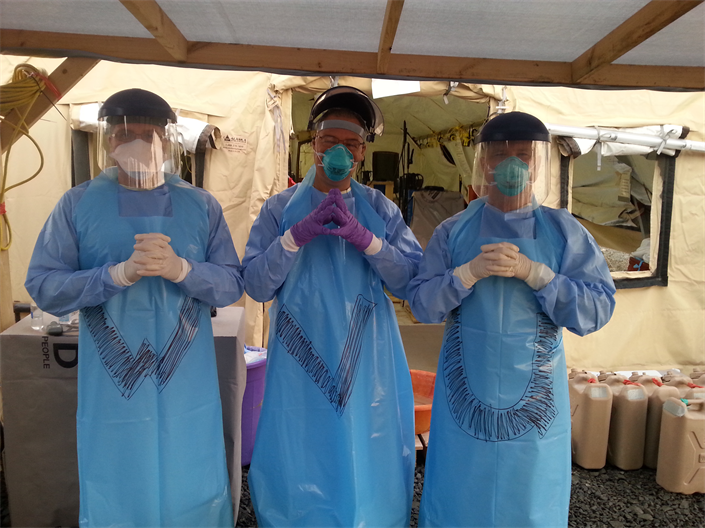Ebola Crisis: MMU-Team 3 Deployment to Camp Eason, Monrovia, Liberia, 2015
By CDR Frank Hershberger
Chief Psychologist
Federal Correctional Institution
Cumberland, Maryland
What was the mission of this deployment?
Mission: MMU-Team 3 deployed to West Africa in response to the Ebola Crisis. Based at Camp Eason, the teams provided direct care to health care workers with Ebola and with other illnesses that initially presented as at risk of Ebola Virus Disease (EVD).
What was your role during this deployment? What skills (scientific, personal, etc.) did you use during your deployment?
Role: Behavioral health provider - initially behavioral health provided training to the team on issues pertinent to coping effectively with deployment. Topics were related to resilience and stress management. During the deployment we completed psychosocial intakes and interacted with patients in the ebola treatment unit. Behavioral Health were active in decontaminating team members as they departed the Hot Zone. We also assisted in other tasks such as moving supplies, building shelves, and installing a new floor in the area. Behavioral health worked with team members and monitored their stated stress levels and individual concerns. We responded to individual needs, as appropriate. In preparation to demobilize, I researched re-entry expectations for the different home states of the team officers. This research assisted in normalizing the re-entry process for the team.
Was this your first deployment?
No, this was my 12th or 13th deployment. My first deployment was to the Mental Health Assistance Team during the World Trade Center response. I have deployed to Hurricanes Lila, Isabel, Frances, Ike, Katrina, and Sandy. I have been deployed to the Secretary's Command Center twice, including the initiation of OIF and the SARS crisis, to a suicide cluster on a reservation, and to Operation Lone Star and Pacific Partnership on the USNS Mercy. I have been a team member on PHS-One RDF since 2006.
What was the most important thing you learned during this deployment? Any tips/tricks to share with fellow scientist officers?
Attitude - You are responsible for your own morale. It is very important that you go into a deployment with a positive and can-do attitude. Every deployment is different and each carries different stressors. Your attitude will determine how you deal with those stressors. Don't add stress by carrying a poor attitude. Additionally, reduce stress by stocking your Go Bag. Set your Go Bag up so that you aren't stressed by not having essential equipment. Have it ready so you aren't stressed by trying to get it together when you should be spending a few hours with your family.
What did you enjoy the most (e.g., favorite memory) about this deployment?
MMU-Team 3 was a very cohesive and supportive team. Everyone was willing to jump in and take care of business.
What would you consider to be your major accomplishment stemming from this deployment?
Being selected to deploy to West Africa for the Ebola Crisis Response was a major accomplishment. The response had a significant impact on a major international crisis. Being just one very small part of this mission was very satisfying.
What were some of the main challenges that you experienced during this deployment?
We were awaiting the birth of my first grandchild while I was in West Africa. The normal concerns were exacerbated by the distance and time zone differences. My son was very concerned about whether I would bring an infectious disease back from Africa. So, the main challenge was dealing with the urgency of expecting a new grandchild and the family's concern about how my return could potentially impact the baby's health. That caused some emotional disconnect. That concern was replicated in how others responded to those returning from West Africa. It was an emotional challenge.
How did you prepare for the deployment – personally or work-wise?
I made sure to follow predeployment expectations regarding immunizations and having my Go Bag packed. My wife is the daughter of a career senior non-commissioned officer and has dealt with my deployments in the past. My CEO was very understanding of the import of this mission and my co-workers helped considerably by acting in my absence.
Were there any classes, trainings that you had completed prior to your deployment that helped you in your current deployment?
The CDC training was phenomenal.
How was your post deployment/reintegration experience? Was it smooth to transition back to your daily life as experienced prior to deployment?
I believe I experienced some depression after the deployment. I had to stay home for 21 days before I returned to work. My family and some people at work had some concerns about the possibility of me bringing an infectious disease back home. That resulted in some emotional discomfort that was difficult to deal with.
Do you have any advice or “pearls of wisdom” for fellow officers who are being
deployed/interested in deploying?
If you are on a deployment team, i.e. an RDF, MHT, or APHT, interact and network with your teammates. Having a connection to your team and your teammates is a great support. Work on your Go Bag regularly; find those little things that can help you or a teammate deal with life's little problems. Take along some collar devices or old shoulder patches to trade with other units who you might meet during a deployment. Keep some extra items in your bag to help someone, such as extra bootlaces and belts. Remember they don't put coffee packets in all of the MREs . If you are like me, you need to stock up on coffee packets.
Is there anything else you’d like to share regarding your deployment?
It is essential that the PHS Commissioned Corps is available and able to deploy.

Back to Deployment Narrative homepage